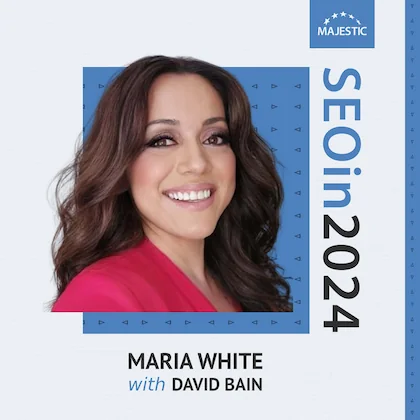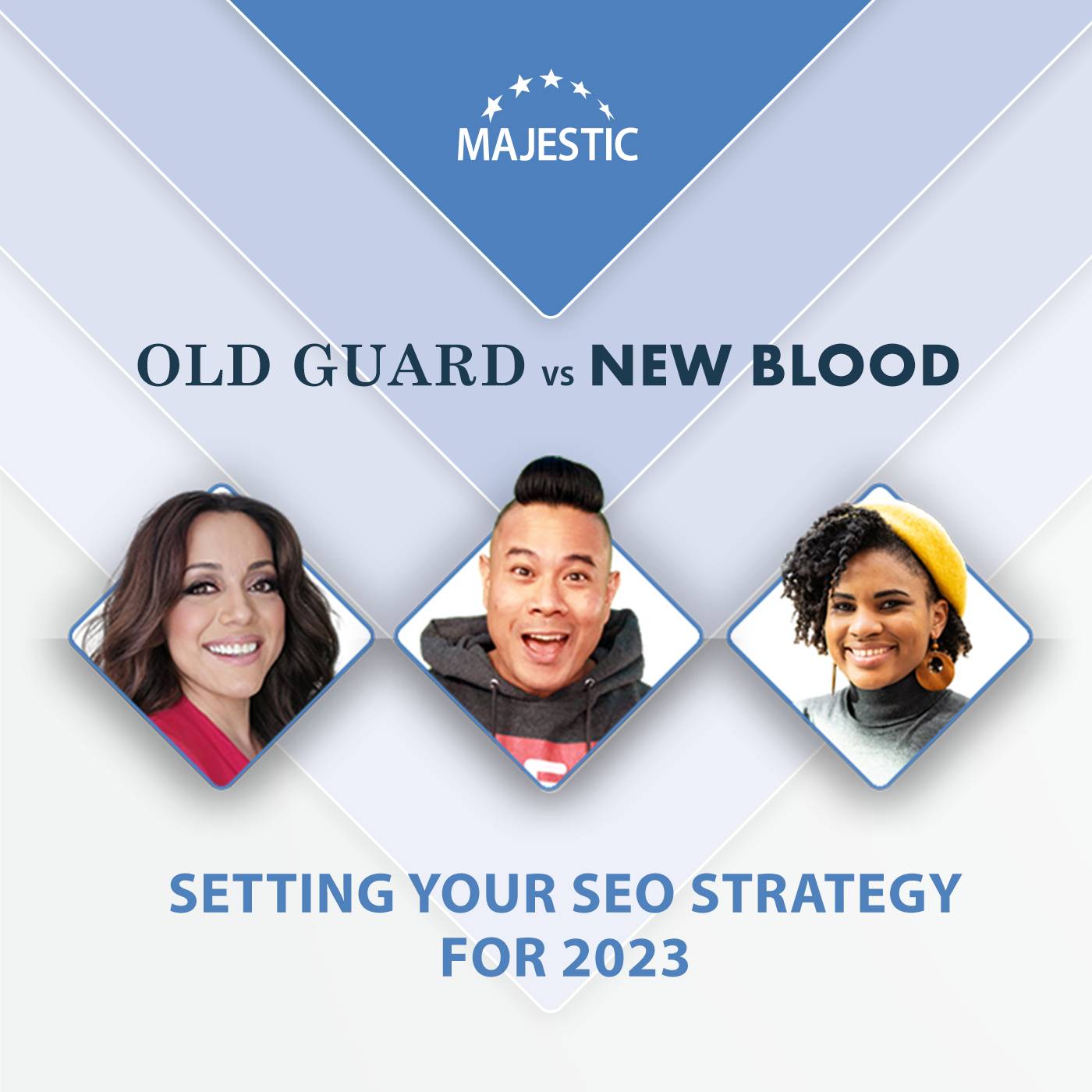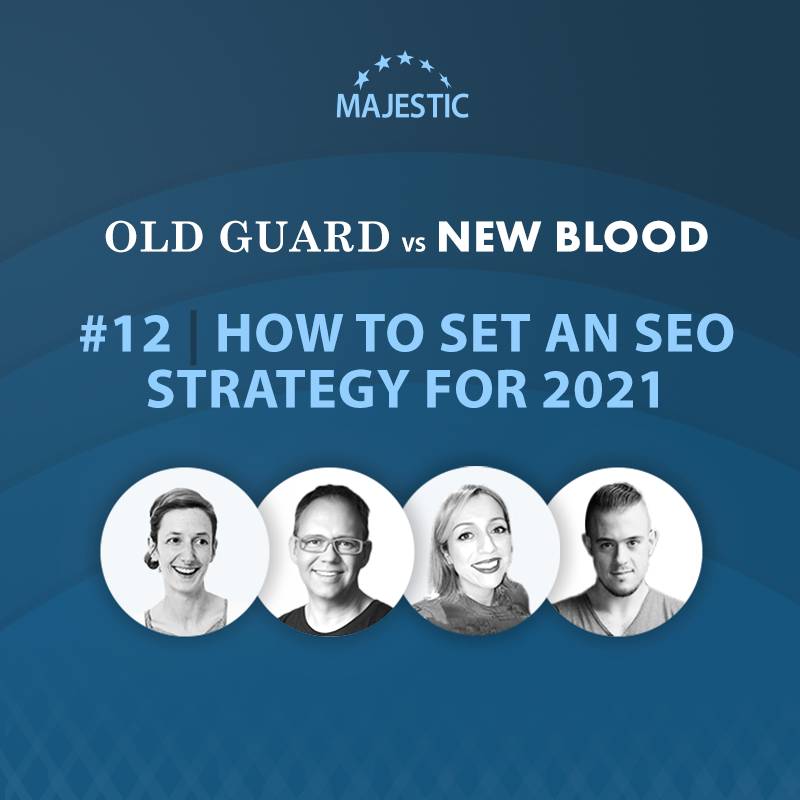-
Site Explorer
- Majestic
- Summary
- Ref Domains
- Backlinks
 New
New Lost
Lost- Context
- Anchor Text
- Pages
- Topics
- Link Graph
- Related Sites
- Advanced Tools
- Author ExplorerBeta
- Summary
- Similar Profiles
- Profile Backlinks
- Attributions
- Compare
-
Link Tools
- My Majestic
- Recent Activity
- Reports
- Campaigns
- Verified Domains
- OpenApps
- API Keys
- Keywords
- Keyword Generator
- Keyword Checker
- Search Explorer
- Link Tools
- Bulk Backlinks
- Neighbourhood Checker
- Submit URLs
- Experimental
- Index Merger
- Link Profile Fight
- Mutual Links
- Solo Links
- PDF Report
- Typo Domain
- Free SEO Tools
- Support
Influence organic search by working with influencers
Maria White
Maria White from Kurt Geiger also knows how valuable well-known content creators can be. She believes that collaborating with them can impact search as much as it impacts your users.

Influence organic search by working with influencers
Maria says: “In a cookieless future and an age of AI, work with influencers to influence your consumers and, more importantly, search.
Influencers do not influence search directly but they do affect search. Before making a purchase, consumers tend to go to social media to find out more information about the product. In the case of luxury and fashion, they want to find out how that product looks on someone else. For example, how does that handbag look on someone? Does it suit certain body frames? What can you put inside? It’s information that, as a brand, we can put together on the landing page.
Also, they want to see directly from the influencer and live that experience through them. In most cases, a small influencer tends to have more influence on the consumer. We have achieved sell-outs working with huge celebrities this year, however, it’s the smaller, more friendly, and more one-to-one influencers who create content that matches the intent of the user – and that intent is to find out more information about a product.
Once the consumer is influenced, and they’ve seen your brand, they will then go to Google to complete the action. They go to search to engage with a brand – whether that’s an ad or organic – and complete a purchase on Google.”
How can SEOs or marketers influence organic search with influencer marketing?
“One of our preferred techniques is to create content with influencers that will become visible to your target audience. It doesn’t have to be super viral and break the internet with a TikTok video; it’s just good content supported by insights or data. Then, you can create a content hub or a collection of content resources that you can seed out to the appropriate media. This way, you can get coverage on important media outlets that your target audience reads.
Create content with influencers and then use it in your ads or on mainstream media. That’s when you get the link that is going to influence organic search.
Any brand in any niche can work with the right influencer, and it’s not necessarily just video or TikTok either. It’s about understanding the consumer and going to the channel where they are. It’s not about going straight to TikTok because that’s a trend, or that’s what some marketing influencer is telling you to do. First, understand your audience in particular.”
Do you need to understand the influencer and what’s important for them?
“Yes. In SEO software, for example, we see that new software vendors sometimes get a big SEO influencer to try the tool and give a guide on how to use it and the benefits of it. Then, people start getting to know that tool via that SEO influencer.
Influencer marketing is still important for influencing your consumers, but also for influencing search via the content you create. That content can then go into longer articles online or into relevant media channels with links, that can have an effect on organic search.”
How do you identify the influencer that’s most appropriate for your brand?
“This is one of the most interesting and fascinating exercises I’ve done for our brand this year. We had to sit down and identify influencers in new countries where we are going to expand. Even in Mexico, where I was born, I might have assumed that a singer like Belinda would be a target. However, as we looked at the data and where our target audience engages the most and starts their journey – in terms of the response to ads or searches for our brand – a handbag enthusiast might be more appropriate.
From there, we had the pleasure of working with influences such as Jennifer Lopez and Paris Hilton. We achieved sell-outs within hours, and all it took was a picture. When you see Jennifer Lopez walking on the red carpet wearing a super glamorous gown, with Ben Affleck by her side, emphasising a beautiful clutch, everyone searches for that clutch.
Even if the name of the product isn’t tagged, every brand has a logo. For us, they see the eagle, and they know it is Kurt Geiger. They search for, ‘Kurt Geiger clutch’, ‘black clutch’, and other terms until they get to what they want. Then they buy the product, and it’s gone within hours. We’ve had that a couple of times this year.
In the case of Paris Hilton, it was just one picture of her on holiday. It was published on Instagram she was all glamorous and beautiful on one of her yachts, with a little white handbag on the side. The reason why our target audience goes crazy for this is because these huge celebrities can afford the most expensive handbags in the world, but they are choosing an attainable luxury brand: us. People go, ‘I can get that look’. Now, that little white handbag is also sold out.
To influence consumers and search for our regular collections that are produced more frequently, like a timeless classic collection, we might work with smaller influencers. They can offer an intimate experience and a connection with the audience that describes why they should buy that handbag, what you can put in it, how it will look on you, and more.”
If you’ve identified the ideal influencers you want to work with, how do you persuade them to work with you?
“It depends on the type of influencer. For the bigger influencers and celebrities, that is 100% through your PR team. The traditional PR team does amazing, incredible things. They have their own way of approaching that type of celebrity.
It’s easier when you work for a brand that your target audience loves. It’s likely that some of the influences that we want to work with will immediately say ‘yes’ when we approach them, because they love the brand.
We have even approached influencers through a comment. There is a girl who has bought over 100 handbags, and she’s a big fan of our brand. A few months ago, we just commented on one of her videos, ‘We love your content!’ She was really happy and we started working with her. It’s easy when the influencers your target audience engages with already love the brand.
However, if that’s not necessarily the case, brands should still utilise influencer marketing. In the world of SEO, I find out about a lot of new tools and new software because of SEO influencers. Aleyda Solis, for example, writes beautiful content, and she’s incredibly trustworthy because she gives a lot to the industry. She’s a drama-free influencer who creates great content and has dedication and passion for the industry. When she recommends a piece of software, you’re likely to explore it – even if you’ve been in the industry for years.
Influencer marketing can work in almost any industry. You just need to find the influencer that can establish that connection between the user and the brand. The work that influencers do is about connection and emotion. It’s up to us as SEOs to sell the facts and the flawless journey on our website through search. Let the influencer sell the dream, the emotions, and the connection. You sell the facts, the numbers, the content, and the rest.”
Are SEOs often too focused on the technical side of the job?
“SEOs think that we should start super technical, that it’s all about Google, and we need to learn all the different algorithms. The new breed of SEOs say it’s all about consumer journey and they use jargon like ‘omnichannel’ that they don’t necessarily understand.
It’s much easier to just have a look at Google Analytics and where your traffic coming from is. Have a look at tools, like Glimpse which connects to Google Trends, which can give you an initial idea of how people are searching for you and where their searches are starting – TikTok, Instagram, etc. Have a look at your data and have a look at how your users come to you and engage with your website.
If they’re coming mostly from TikTok, that means your users are looking to get information and influence on TikTok before they complete an action on Google. There is a myth out there that TikTok is replacing Google because Gen Z is using TikTok first. It’s not that people are using TikTok or video more, it’s that people are always going to seek information before making a purchase that they really value – which has been true as long as marketing has existed. People will look for information from video, word-of-mouth, newspapers, or any other source before making an impactful purchasing decision.
Understand that users start their shopping journey with information. Then, create content and a content hub or collection of resources that the target media for your target audience can use for a longer article, so that you can get a link. Also, ‘target media’ doesn’t just mean national publications. If you are an SEO tool, you’re not going to go to the Telegraph and advertise your new SEO software. If you manage to get a link on the Guardian, what is the value of that link? Who is going to come from the Guardian to buy your software?
Target media can be an influencer blog or a newsletter. You want to get the link in the right place. When you invest a lot of money on media links, you need to make sure that those links are placed where your target audience is going to engage, not just because it’s a link.”
If an SEO is struggling for time, what should they stop doing right now so they can spend more time doing what you suggest in 2024?
“Stop dedicating all of your time to one sole strategy. In an age of AI and a cookieless future, how are you going to create more relevant and personalised campaigns? Influencer marketing is a great way to do that. Don’t focus only on technical SEO and understanding the algorithm, how Google works, SGE, etc. We know SGE is going to happen and, thanks to some incredible researchers like Lily Ray, Marie Haynes, and Aleyda, we know what might happen.
You don’t need to understand how Google or the TikTok algorithm works to be the best content creator. The most complex machine you have to understand is the human brain and how people behave. I’m not telling you to become a neurosurgeon or go into neuroscience. Understand people and what type of content your target audience consumes, where, and how. That should drive your strategy.
Stop obsessing. Don’t become too technical, too video, or too TikTok. You need a bit of everything. Also, get out of the SEO world and try to understand paid media, digital PR, etc. Get out of your head and go and understand how other marketing channels impact SEO.”
Maria White is Search Lead at Kurt Geiger, and you can find her at KurtGeiger.com.
Also with Maria White
Choose Your Own Learning Style
 Video
Video
If you like to get up-close with your favourite SEO experts, these one-to-one interviews might just be for you.
Watch all of our episodes, FREE, on our dedicated SEO in 2024 playlist.
 Podcast
Podcast
Maybe you are more of a listener than a watcher, or prefer to learn while you commute.
SEO in 2024 is available now via all the usual podcast platforms
Don't miss out
Opt-in to receive email updates.
It's the fastest way to find out more about SEO in 2025.
Could we improve this page for you? Please tell us








